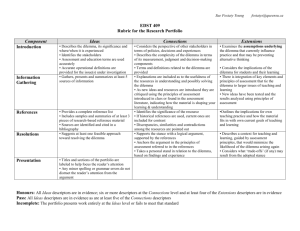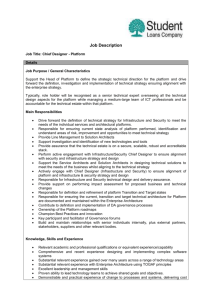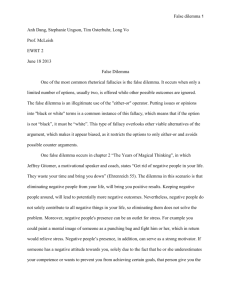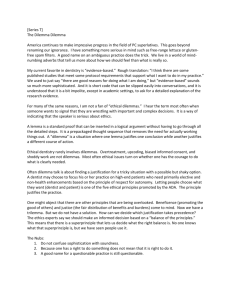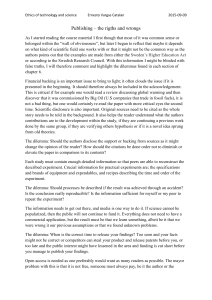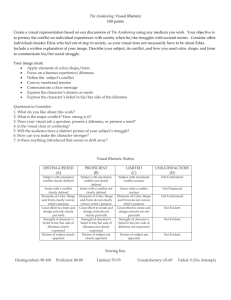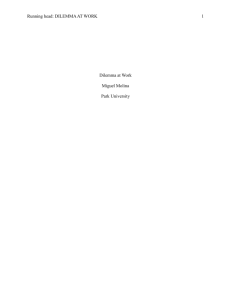click here - The Good Project
advertisement
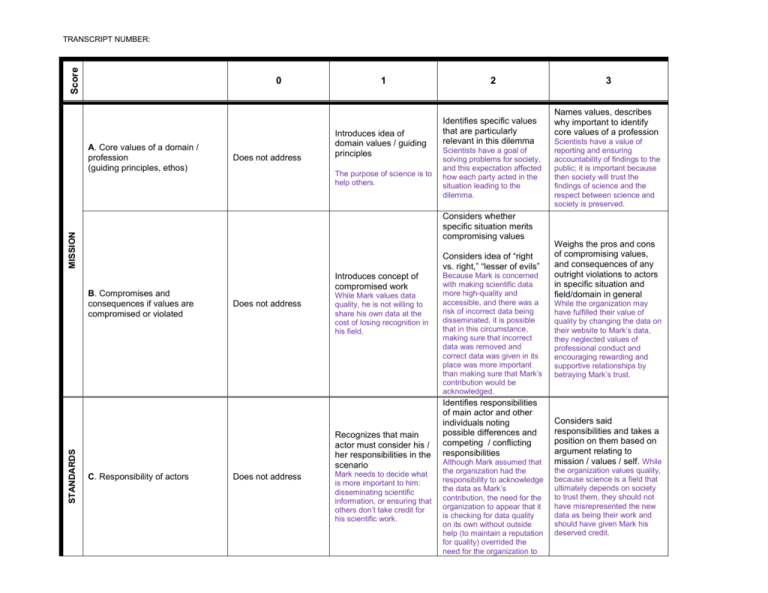
Score TRANSCRIPT NUMBER: 0 A. Core values of a domain / profession (guiding principles, ethos) Does not address 1 Introduces idea of domain values / guiding principles The purpose of science is to help others. Identifies specific values that are particularly relevant in this dilemma Scientists have a goal of solving problems for society, and this expectation affected how each party acted in the situation leading to the dilemma. MISSION Considers whether specific situation merits compromising values Considers idea of “right vs. right,” “lesser of evils” B. Compromises and consequences if values are compromised or violated STANDARDS 2 Introduces concept of compromised work Does not address While Mark values data quality, he is not willing to share his own data at the cost of losing recognition in his field. Recognizes that main actor must consider his / her responsibilities in the scenario C. Responsibility of actors Does not address Mark needs to decide what is more important to him: disseminating scientific information, or ensuring that others don’t take credit for his scientific work. Because Mark is concerned with making scientific data more high-quality and accessible, and there was a risk of incorrect data being disseminated, it is possible that in this circumstance, making sure that incorrect data was removed and correct data was given in its place was more important than making sure that Mark’s contribution would be acknowledged. Identifies responsibilities of main actor and other individuals noting possible differences and competing / conflicting responsibilities Although Mark assumed that the organization had the responsibility to acknowledge the data as Mark’s contribution, the need for the organization to appear that it is checking for data quality on its own without outside help (to maintain a reputation for quality) overrided the need for the organization to 3 Names values, describes why important to identify core values of a profession Scientists have a value of reporting and ensuring accountability of findings to the public; it is important because then society will trust the findings of science and the respect between science and society is preserved. Weighs the pros and cons of compromising values, and consequences of any outright violations to actors in specific situation and field/domain in general While the organization may have fulfilled their value of quality by changing the data on their website to Mark’s data, they neglected values of professional conduct and encouraging rewarding and supportive relationships by betraying Mark’s trust. Considers said responsibilities and takes a position on them based on argument relating to mission / values / self. While the organization values quality, because science is a field that ultimately depends on society to trust them, they should not have misrepresented the new data as being their work and should have given Mark his deserved credit. TRANSCRIPT NUMBER: follow professional conduct. SELF D. Neighborly morality & ethics of role E. Individual background, expertise, beliefs, values Identifies issues relating to neighborly morality and ethics of role in the dilemma (eg personperson relations outside of work context simpler than those filtered through professional role) Does not address Does not address While under normal circumstances, Mark might not tolerate someone not giving him credit for something he had done, because of the influence that other professionals in the field may have on his career, Mark was discouraged by his mentor and other professors from complaining about not being given credit. Recognizes that individual background, expertise, beliefs, values of individual actor in dilemma as relevant to how he handles the dilemma Mark’s initial sense of altruism and high regard for other practitioners in the field affects how he first views the conflict concerning the organization’s use of his data: with shock that his trust could be betrayed. Identifies relationship between the two – are they in alignment or are they in conflict? Considers idea of “disinterestedness” in professional role In this circumstance, Mark’s desire to seek recognition for his work is not in alignment with an expectation of respecting (or not questioning) those in authority. However, in favor of advancing professionally so Mark can continue making contributions to the field, Mark may consider letting go of his grudge and continuing to make strong contributions to scientific research and data management. Analyzes how these particular factors influence how the dilemma is handled His initial admiration of and sentiments of goodwill for the field cause Mark to feel conflicted when he learns that he will not receive acknowledgement for these qualities, something he also wishes for personally. Takes a position on how the actor should navigate these various standards with a well-supported justification Considers idea of “disinterestedness” in professional role, putting aside of personal interests for greater good. Mark should not allow his interest in gaining recognition prevent him from providing important data to others in the field. Although Mark felt maligned by the way the organization treated him, he should consider the greater benefit that sharing his data has on the field – in terms of ensuring that correct data is being used in the field and also that the information provided by his field can be trusted by society. Takes a position on to what extent he/she aggress with how individual actor navigated the dilemma, making connections to ideas about mission and standard I can understand why Mark decided to “play hardball”. Because he has this new notion of the field as being very “political”, in a sense Mark has now been motivated to play politics as well - except in a manner that protects his own interests. Given that the scientific research field does not appear to value proper recognition in a way that Mark feels will rightfully acknowledge TRANSCRIPT NUMBER: his contribution, it is best for Mark to stay true to himself and only engage in opportunities where he would either receive credit or share data to the extent he would not mind being unrecognized for his efforts. F. Relationships & Role Models Does not address Acknowledges horizontal and vertical relationships have an impact on decision-making Mark’s decision on whether or not to continue sharing data is impacted by the actions of those in authority. G. Reflectiveness Does not address Acknowledges individual’s decision making will have an impact on his / her sense of personal and professional identity The decision that Mark makes concerning how he shares data in the future can impact how Mark views his role in the scientific research community and the kinds of incentives that Awareness of power differences between senior and junior persons and the difficulty of navigating this power differential when opinions conflict Mark has difficulty in acting upon the set individual values he has (of ensuring that he is recognized for his work) because acting on these values would mean getting into a conflict with senior members of his field who have the power to ruin his career and make sure he does not have access to certain opportunities in the future. Discusses potential consequences individual’s decision making will have on his / her sense of personal and profession identity Because Mark decided to be selective about withholding or distributing limited data, he not only will become more guarded in the way he interacts with other members of his profession, but he may also not be as active a Discusses consequences of positive or negative relationship / role model; discusses ways in which an individual can negotiate conflicting opinions in relation to his/her own ethical standards. Mark’s mentor served as a positive role model in this situation, and helped him to navigate a difficult situation by explaining why it would not be good for him to write a letter of complaint and how, unfortunately, politics dominates the field of science. With this new understanding that Mark’s mentor provided, Mark now knows why refraining from writing a letter of complaint could actually protect and promote his professional reputation, just as he wanted – such as by not upsetting senior member of his profession and possibly ensuring he can get a letter of recommendation from this senior member. Proposes a strategy for how one might negotiate the dilemma in a way that preserves sense of personal and professional identity (eg references idea of mirror test) One way in which Mark could continue to share knowledge while preventing others from taking credit for his work is by only presenting his data on the DIAMOND-EDGED THINKING TRANSCRIPT NUMBER: H. Awareness of GW Diamond as distinct operational realms within an area of work that can have differing and conflicting sets of values: Does not address motivate Mark to pursue his work. participant in sharing knowledge (and possibly limiting his opportunities to be recognized for his work). condition that he be given credit. If an organization or individual can guarantee that they will give Mark credit, Mark could feel more comfortable about sharing his work with others. Lists and describes at least 2 areas of alignment or misalignment in values from following categories: Lists and describes at least 3 areas of alignment or misalignment in values from following categories: Lists and describes all 4 areas of alignment or misalignment in values from following categories Individual values Domain values Priorities of field Messages from society Individual values Domain values Priorities of field Messages from society Individual values Domain values Priorities of field Messages from society While Mark places value on being recognized in his field, the organization preferred to preserve their own reputation versus recognizing the work of Mark. The field of science is supposed to place emphasis on helping humanity, and it was Mark’s intention by sharing his data that he would ultimately help humanity by ensuring that the organization was not providing inaccurate data. Science may be considered a noble field for the “problemsolvers” of the world, but within Mark’s professional circle, playing politics and protecting one’s own reputation – whether for an individual or organization – takes priority over fulfilling any notions of nobility society may have of the scientific research field.
